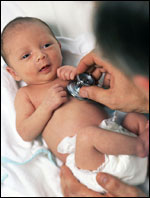CDC Features
Current Features
Measles Update: Outbreaks Continue in U.S.


CDC and state health officials are investigating and responding to cases and outbreaks of measles across the U.S. Measles is a highly contagious disease spread through coughing or sneezing. Symptoms can include rash, high fever, coughing, and runny nose. The disease can also cause more serious complications, such as ear infections, pneumonia, encephalitis (inflammation of the brain) — even death.
From January 1 through April 25, 2008, CDC received a total of 64 reports of confirmed measles cases in nine states — the highest number for the same time period since 2001. In four of the states —Arizona, New York, Michigan, and Wisconsin — outbreaks (3 or more cases linked in time or place) are ongoing. Outbreaks may occur when measles cases are imported into the U.S. Ten of the recent case-patients (5 US residents and 5 visitors to the U.S.) acquired measles abroad, and the remaining cases are considered linked to the imported cases.
Of the 64 people infected by the measles virus, only 1 had documentation of prior vaccination. Among the other 63 case-patients were 14 infants who were too young to be vaccinated. Many of the cases among US children occurred in children whose parents claimed exemption from vaccination due to religious or personal beliefs, or in children too young to be vaccinated. Disease transmission occurred in a variety of community and healthcare settings, including homes, childcare centers, schools, hospitals, emergency rooms, and doctors' offices.

These cases remind us that it is important to vaccinate children and adults to protect them against measles. Even though the ongoing transmission of measles was declared eliminated in the U.S. in 2000, the disease is still common in other parts of the world and can be imported into the U.S. from many countries, including countries in Europe. Worldwide, 20 million cases of measles still occur each year, and the disease is a significant cause of vaccine-preventable death among children. In 2005, 311,000 children under age 5 died from the disease.
The measles vaccine is administered as MMR, a combination vaccine that provides protection against measles, mumps, and rubella. The MMR vaccine is strongly endorsed by medical and public health experts as safe and effective. All children should receive two doses of MMR vaccine. The first dose is recommended at 12–15 months of age and the second dose at 4–6 years of age. All adults born during or after 1957 should receive at least one dose of vaccine unless they have documented evidence of measles immunity (a blood test or a physician's diagnosis of measles). Two doses are recommended for all international travelers, healthcare personnel, and students of secondary and post-secondary educational facilities. Infants 6–11 months of age should receive one dose prior to travel abroad.
For More Information
- For complete information on measles cases reported in the U.S. in 2008, read Measles---United States, January 1--April 25, 2008 (MMWR, 9 May 2008)
- To learn more about measles and the MMR vaccine, go to CDC's Measles Vaccination page.
- To learn about a 2007 measles outbreak in the U.S. and steps that can be taken to prevent future outbreaks, listen to "Measles Can Travel" (
 4 minutes, 1 second).
4 minutes, 1 second).
Page last updated: August 22, 2008
Content source: National Center for Immunization and Respiratory Diseases
Content owner: National Center for Health Marketing
URL for this page: www.cdc.gov/Features/MeaslesUpdate

